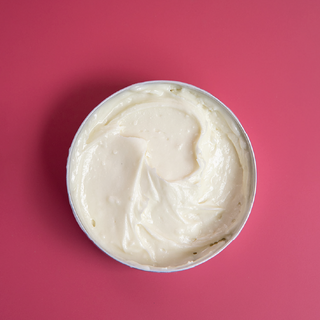*Disclaimer: This article is not medical advice. We always recommend doing your own research and advising your healthcare team before making any changes.
If you’ve been googling “how to heal psoriasis,” you’ve probably noticed a lot of conflicting information.
Some say there’s no cure, and you’re stuck smearing steroid cream for the rest of your days.
Others advertise that "This 7-day psoriasis detox diet is the answer to all your skin woes!!".
So who’s right?
How do you cure psoriasis permanently? Is it even possible?
Let’s unpack all the science (and common sense) around what causes psoriasis and how you can start to heal it naturally– without a prescription or restrictive diet.
What is Psoriasis?
Psoriasis is a condition that goes much deeper than the skin.
It’s defined as a chronic autoimmune disease where the immune system turns on the body’s skin cells. This attack causes the skin to overcompensate by producing more cells.
Healthy skin cells replenish every 10-30 days, but psoriasis triggers this to happen every 3-4 days resulting in raised, red, itchy, and often painful patches on the skin. Though, you probably already knew that bit.
Aside from the itchy and painful physical symptoms, psoriasis can also contribute to mental and emotional symptoms such as anxiety, depression, and addiction. (1)
Instead of asking how to “fix” the problem, we should first look at what brought the body to this point.
From there, we can start to understand where to go next.
What is the Root Cause of Psoriasis?
The short answer is systemic inflammation and oxidative stress. (2)
Our body is a system– which means everything is connected. Psoriasis is a sign of inflammation occurring in the body at large. This is why psoriasis has several comorbidities, including
- Inflammatory bowel disease
- Heart conditions
- Oral health problems
- Mood disorders
- Metabolic dysfunction
- High blood pressure
Inflammation has a domino effect on the body– wreaking havoc on each system and, eventually, showing up on the skin. Dr. Ray Peat describes inflammation as the increasing gap between the body’s resources and the demands placed on it by the environment (3). When we don’t get the nutrients we need, our stress load skyrockets making us more vulnerable to disease.
Deficiencies in These Vitamins + Minerals May Contribute to Inflammation:
Can you Heal Psoriasis Permanently?
Yes, it is possible. But there are no quick fixes.
You can successfully calm systemic inflammation and heal psoriasis by supporting the body through lifestyle habits, nourishing skincare, and bio-energetic nutrition.
This is why topical steroid creams are just a bandaid– they don’t tackle the root of the issue. And they can often make matters worse by suppressing the immune system further instead of giving the body the resources it’s desperately calling out for. (10)
If you’re looking for a more effective and holistic approach to healing psoriasis, we recommend checking out the work of Jake Marotta. He battled psoriasis for years before finding relief through working with his body– instead of against it. He now educates others in a down-to-earth way through his 3-pillar Proven Psoriasis Protocol.
His emphasis on pro-metabolic nutrition and supportive daily habits have helped hundreds of people boost their overall health and ultimately heal psoriasis– once and for all.
Because healthy skin truly starts on the inside.
So Which “Psoriasis Diet” Actually Works?
The laundry list of diets that supposedly heal psoriasis is long– like really long.
Keto, plant-based, vegan, paleo, dairy-free, Mediterranean, carnivore, and gluten-free– just to scratch the surface. We are bombarded with tons of different ideas in our day and age– even a casual Instagram scroll is exhausting.
Instead of following the latest trend on social media, we should focus more on how the body works.
High inflammation means not having enough energy and resources.
What is the body’s main energy source? Carbs.
- Root veggies and fruits
- Juices (fresh and not from concentrate)
- Raw honey
- Maple syrup
- Rice
How does the body absorb and use vitamins? Fats.
- Tallow
- Butter
- Ghee
- Coconut oil
- Raw cream
What helps the body build enzymes and move oxygen? Protein.
- Collagen
- Gelatin
- Raw milk
- Bone broths
- Organ meats
- Muscle meats
- Eggs
- Seafood
This is why restricting one macronutrient is never the answer. They’re all necessary.
It’s all about balance and bioavailability. And one of the best ways to ensure you’re getting in all the bioavailable nutrients you need is through a whole-food, animal-based approach. Filling your plate with enough nutrient-dense foods ensures your body has all the building blocks it needs to function optimally.
When buying animal products, it’s always best to seek out pasture-raised, grass-fed, unpasteurized options from local farmers. Not only do they taste better, but they’re also higher in all the vitamins and minerals your body (and skin) needs.
What is the Best Cream for Psoriasis?
We’ll say it one more time for the people in the back– no topical treatment will heal psoriasis on its own.
But when paired with a nutritious diet, the right skincare can be an effective tool to encourage further healing and manage symptoms. You already know we aren’t huge fans of steroid creams because of their immune-suppressive effects. Instead, we prefer to nourish compromised skin with vitamin-rich, fat-based products that your skin recognizes– like tallow.
Tallow is excellent for soothing psoriasis because its lipid profile is very similar to our skin’s natural oils– unlike traditional vegetable oil-based moisturizers that may increase oxidative stress.
Grass-fed tallow is packed with bio-available micronutrients like
Our go-to pick for inflamed skin conditions, like psoriasis, is hands-down our MAGNESIUM BODY LOTION.
Magnesium is a dream come true for people with psoriasis because it reduces inflammation and regulates cellular repair. One study showed that salt rich in magnesium chloride from deep layers of the Dead Sea significantly reduced inflammation and improved the skin’s barrier. But if you don’t have time to take a dip in the Dead Sea, though that sounds lovely– try incorporating regular magnesium supplementation. (11) We discuss the best types of magnesium and ways to get more of it in this blog post.
So are you ready to heal psoriasis for good?
Start by supporting the skin from all angles with nourishing foods, supportive habits, and healing skincare.
As always, while we hope to be a no-nonsense resource, we encourage you to do your own research to find the healthiest options for you and your family. You can check out our whole collection of good-for-you, tallow-based skincare products by clicking the link below. We hope to see you there!
REFERENCES:
- Sahi FM, Masood A, Danawar NA, Mekaiel A, Malik BH. Association Between Psoriasis and Depression: A Traditional Review. Cureus. 2020 Aug 13;12(8):e9708. doi: 10.7759/cureus.9708. PMID: 32944430; PMCID: PMC7489316. https://www.ncbi.nlm.nih.gov/pmc/articles/PMC7489316/
- Cannavò SP, Riso G, Casciaro M, Di Salvo E, Gangemi S. Oxidative stress involvement in psoriasis: a systematic review. Free Radic Res. 2019 Aug;53(8):829-840. doi: 10.1080/10715762.2019.1648800. Epub 2019 Aug 8. PMID: 31392915. https://pubmed.ncbi.nlm.nih.gov/31392915/
- Peat, R. (n.d.). Regeneration and degeneration - Types of inflammation change with aging. Raypeat.com. Retrieved November 4, 2022, from https://raypeat.com/articles/articles/regeneration-degeneration.shtml
- Lei L, Su J, Chen J, Chen W, Chen X, Peng C. Abnormal Serum Copper and Zinc Levels in Patients with Psoriasis: A Meta-Analysis. Indian J Dermatol. 2019 May-Jun;64(3):224-230. doi: 10.4103/ijd.IJD_475_18. PMID: 31148862; PMCID: PMC6537698. https://www.ncbi.nlm.nih.gov/pmc/articles/PMC6537698/#:~:text=%5B10%5D%20Zn%20serves%20as%20a,serum%20Zn%20levels%20were%20decreased.
- Gangadevi, V., Thatikonda, S., Pooladanda, V. et al. Selenium nanoparticles produce a beneficial effect in psoriasis by reducing epidermal hyperproliferation and inflammation. J Nanobiotechnol 19, 101 (2021). https://doi.org/10.1186/s12951-021-00842-3
- Wilchowski SM, Lareau T. Psoriasis: Are Your Patients D-pleted? A Brief Literature Review on Vitamin D Deficiency and Its Role in Psoriasis. J Clin Aesthet Dermatol. 2022 Mar;15(3 Suppl 1):S30-S33. PMID: 35382439; PMCID: PMC8970208. https://www.ncbi.nlm.nih.gov/pmc/articles/PMC8970208/
- Varani J, Warner RL, Gharaee-Kermani M, Phan SH, Kang S, Chung JH, Wang ZQ, Datta SC, Fisher GJ, Voorhees JJ. Vitamin A antagonizes decreased cell growth and elevated collagen-degrading matrix metalloproteinases and stimulates collagen accumulation in naturally aged human skin. J Invest Dermatol. 2000 Mar;114(3):480-6. doi: 10.1046/j.1523-1747.2000.00902.x. PMID: 10692106. https://pubmed.ncbi.nlm.nih.gov/10692106/
- Liu X, Yang G, Luo M, Lan Q, Shi X, Deng H, Wang N, Xu X, Zhang C. Serum vitamin E levels and chronic inflammatory skin diseases: A systematic review and meta-analysis. PLoS One. 2021 Dec 14;16(12):e0261259. doi: 10.1371/journal.pone.0261259. PMID: 34905558; PMCID: PMC8670689. https://pubmed.ncbi.nlm.nih.gov/34905558/
- Stanescu AMA, Simionescu AA, Diaconu CC. Oral Vitamin D Therapy in Patients with Psoriasis. Nutrients. 2021 Jan 6;13(1):163. doi: 10.3390/nu13010163. PMID: 33419149; PMCID: PMC7825555. https://www.ncbi.nlm.nih.gov/pmc/articles/PMC7825555/
- Dhar S, Seth J, Parikh D. Systemic side-effects of topical corticosteroids. Indian J Dermatol. 2014 Sep;59(5):460-4. doi: 10.4103/0019-5154.139874. PMID: 25284850; PMCID: PMC4171913. https://www.ncbi.nlm.nih.gov/pmc/articles/PMC4171913/
- Proksch E, Nissen HP, Bremgartner M, Urquhart C. Bathing in a magnesium-rich Dead Sea salt solution improves skin barrier function, enhances skin hydration, and reduces inflammation in atopic dry skin. Int J Dermatol. 2005 Feb;44(2):151-7. doi: 10.1111/j.1365-4632.2005.02079.x. PMID: 15689218. https://pubmed.ncbi.nlm.nih.gov/15689218/


